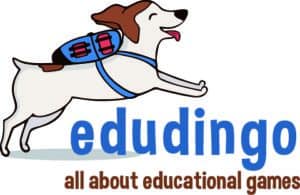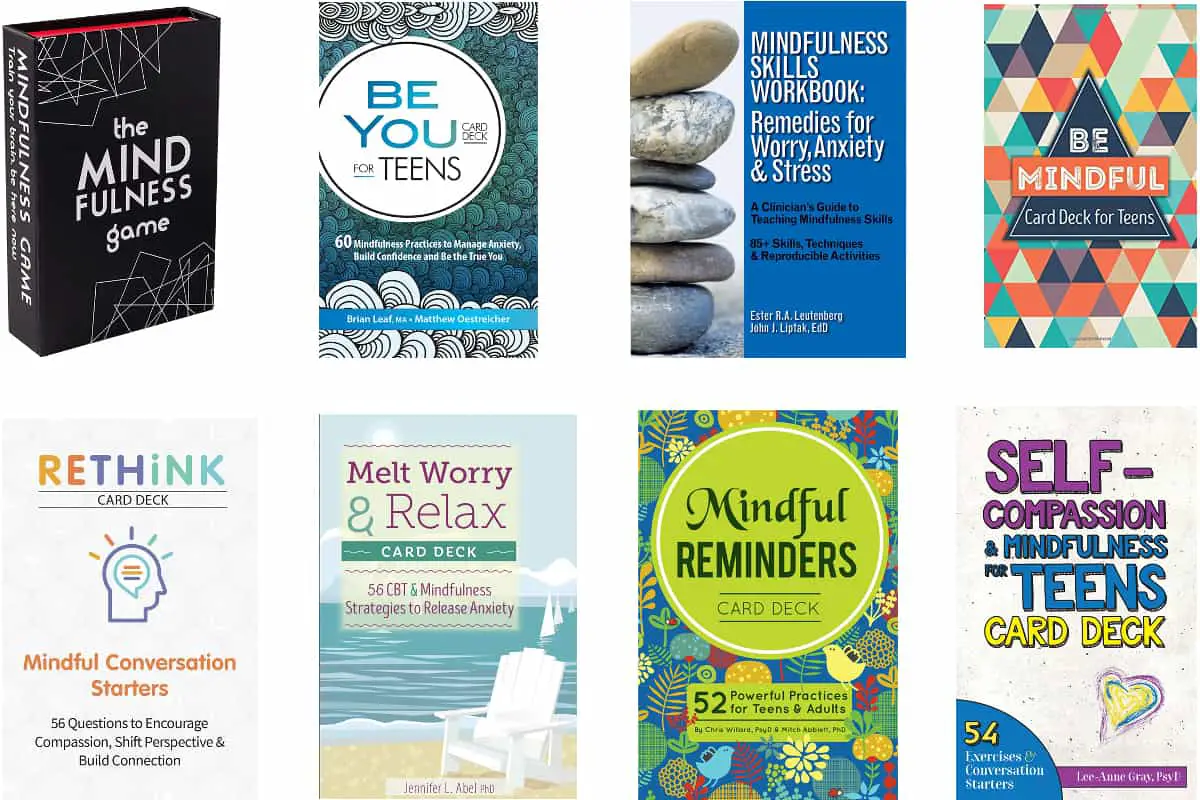This post contains affiliate links.
Mindfulness card games can be very helpful for teens that often experience a period of their life full of doubts and important changes. This is why I wanted to know which games I could find.
What mindfulness card games for teens are available? There are 8 mindfulness card games designed for teens and that can be played with parents, teachers, and therapists. The Mindfulness Game by Innericons is particularly effective is as it is the only “real game” (the other ones are sets of practice cards) which creates a completely different dynamic and improves the success of the approach with teens.
Mindfulness Card Games Comparison Table
I recommend the 4 following games (I actually recommend them for teachers, counselors, therapists or parents):
| Game | Age | Players | Price | Additional Activities | Rating |
|---|---|---|---|---|---|
| The Mindfulness Game | 8+ | 3‑15 | $$ | Meditation, Competitive, Managing Emotions | ★★★★★ |
| Be Mindful | 10+ | 1+ | $$ | Managing Emotions | ★★★★☆ |
| Mindful Reminders | 10+ | 1+ | $$ | Managing Emotions | ★★★☆☆ |
| RETHiNK | 12+ | 1+ | $$ | ★★★☆☆ |
Mindfulness Card Games
The Mindfulness Game (Innericons)
★★★★★
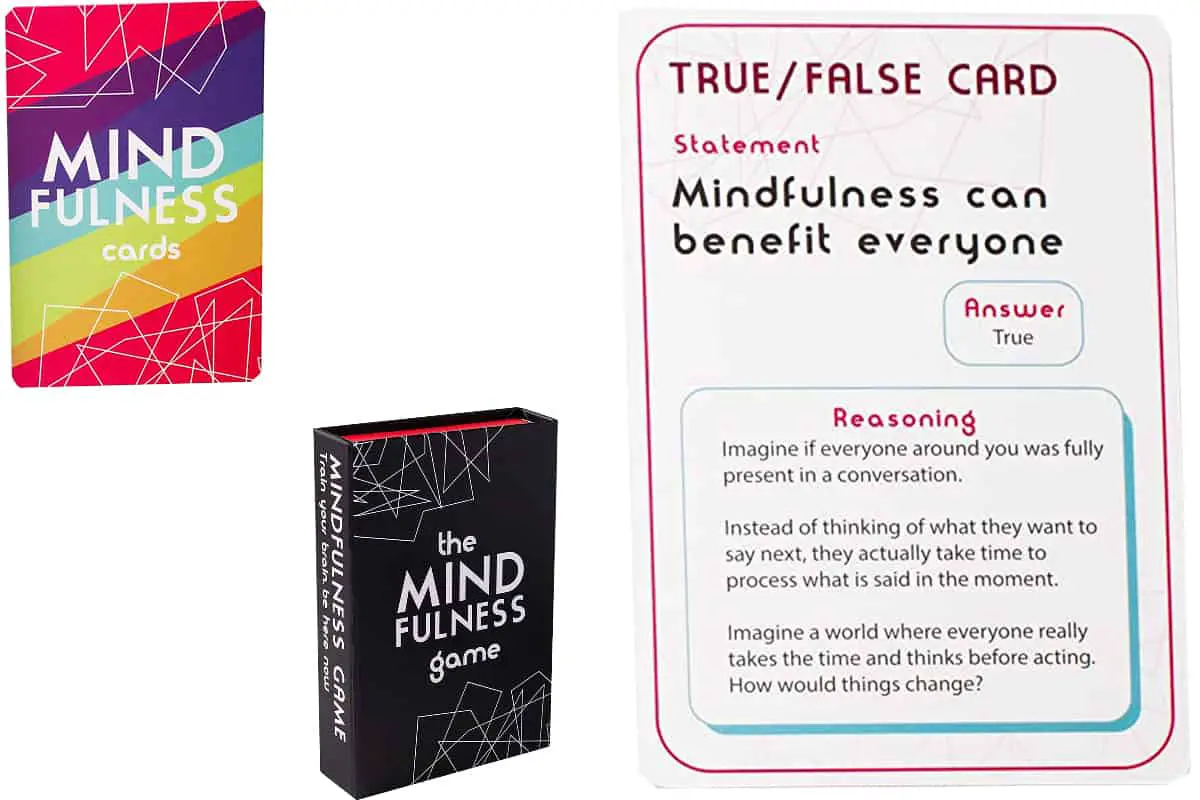
Players: 3-15 | Age: 8+
The Mindfulness Game includes 40 unique cards that teach how to breathe properly and meditate to deal with stress. It is designed by teachers and therapists.
includes 40 unique cards that teach how to breathe properly and meditate to deal with stress. It is designed by teachers and therapists.
I highly recommend The Mindfulness Game because it actually is “A game” with winners or losers of each activity. You might think that there should be no “winner” or “loser” when doing mindfulness activities, but here the winners are those that can sustain the activity with the most concentration (or losers with the least concentration) – so that this little “competition” makes the game more fun, makes a lot of sense as an instant feedback mechanism, creates some challenge for everyone and most importantly results in the exercises doing more often successfully and with more concentration.
If you are not comfortable with having “loser” cards, I suggest that you decide that for these “loser” cards, everybody wins 1 point, except the person who was supposed to be the “loser”. It is psychologically totally different, although from the game’s mechanics point of view, it is strictly the same.
Another positive aspect is that the activities are not too static. They are not just “calming down” activities but bring mindfulness to another level.
Also, there is a complete description or directions on the cards according to what applies to the type of card which is clearly separated from the card’s main point. This makes it very easy to use the cards either in “beginner mode” (where you want to read the complete explanation in order to fully understand what you are doing) or in “Practitioner mode” (where you already know the details, and the cards are used in the game to draw cards in a random manner and apply them immediately).
The cards are even better for group sessions rather than individual practice (because they constitute a “real game”. They are divided into several categories:
- Mindful practice cards, e.g.
- Title: “Quiet Body”
- Objective: “to sit in stillness”
- Directions: I do not reproduce here, but there are three paragraphs of very simple to understand directions.
- Loser: “The first person to move takes this card”
- Visualization cards, e.g.
- Title: “Slow Stone”
- Directions: In this card you have a quite long explanation in two “big” but very clear paragraphs that feel like a story
- True/false cards, e.g.
- Statement: “Mindfulness can benefit everyone”
- Answer: “Yes”
- Explanation of why that is the case. By the way the explanation for this card is great!
The deck includes three guided meditation cards.
Be Mindful (PESI Publishing)
★★★★☆
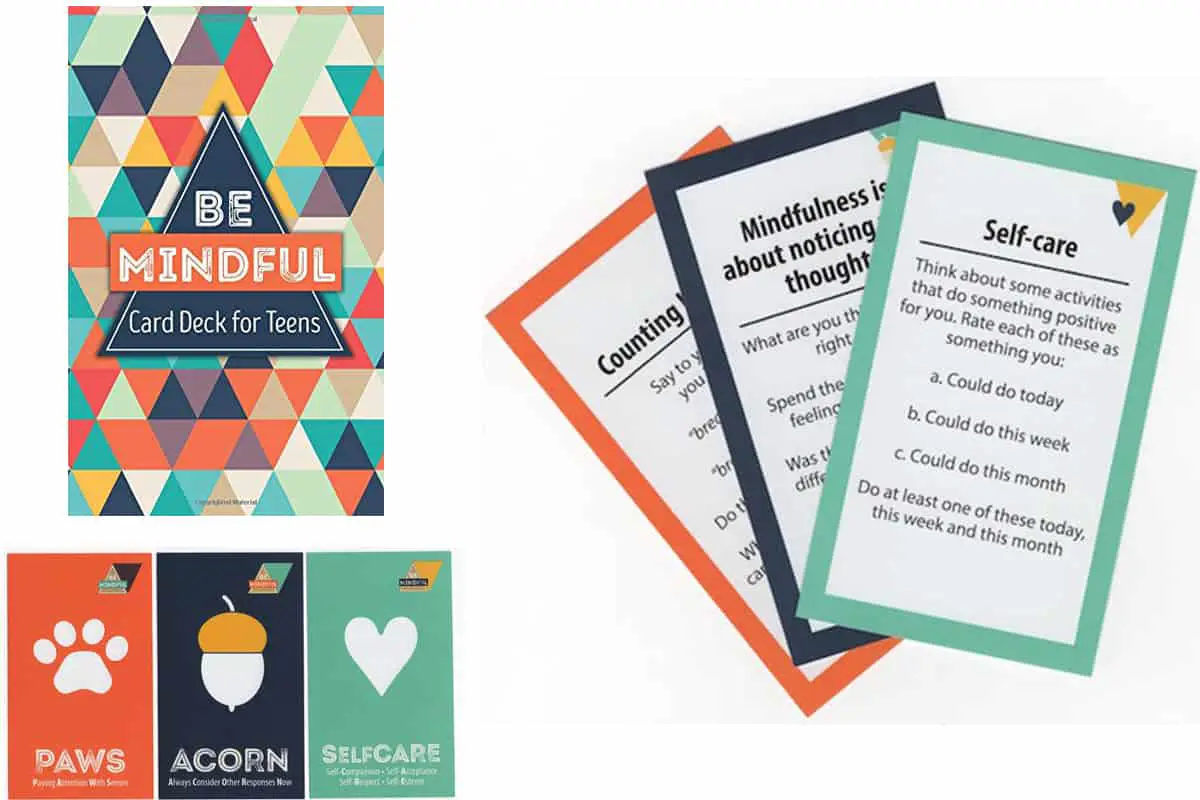
Players: 1+ | Age: 10+ | Author: Gina M. Biegel
Be Mindful is a card deck for teens that helps reduce stress, be focused and attentive. Teens can also learn how to deal with moodiness, anger, anxiety and just live in the present moment. The cards are affirmative and can be used for starting group discussions and for individual sessions as well. There are three card categories (plus two “wild cards” you can write on):
is a card deck for teens that helps reduce stress, be focused and attentive. Teens can also learn how to deal with moodiness, anger, anxiety and just live in the present moment. The cards are affirmative and can be used for starting group discussions and for individual sessions as well. There are three card categories (plus two “wild cards” you can write on):
- PAWS (Pay Attention With Senses)
- SelfCARE (Self-Compassion, Self-Acceptance, Self-Respect, Self-Esteem)
- ACORN (Always Consider Other Responses Now)
I recommend Be Mindful because the cards are relevant for teens, very accessible for “beginners” in mindfulness, and in fact can also be used by adults. Here are three sample cards:
- PAWS – Sense the day – Today, think about the senses when you do any activity. Notice what you can see, smell, touch, taste and hear all day.
- SelfCARE – Kindness to another – Do or say something nice to someone else today for no reason. Notice what it feels like when you are kind to another.
- ACORN – Mindful call – Instead of texting someone today, give them a call. Be thoughtful with what you say. It feels a lot different hearing someone’s voice than receiving a text. What was it like to call?
Mindful Reminders (PESI Publishing & Media)
★★★☆☆
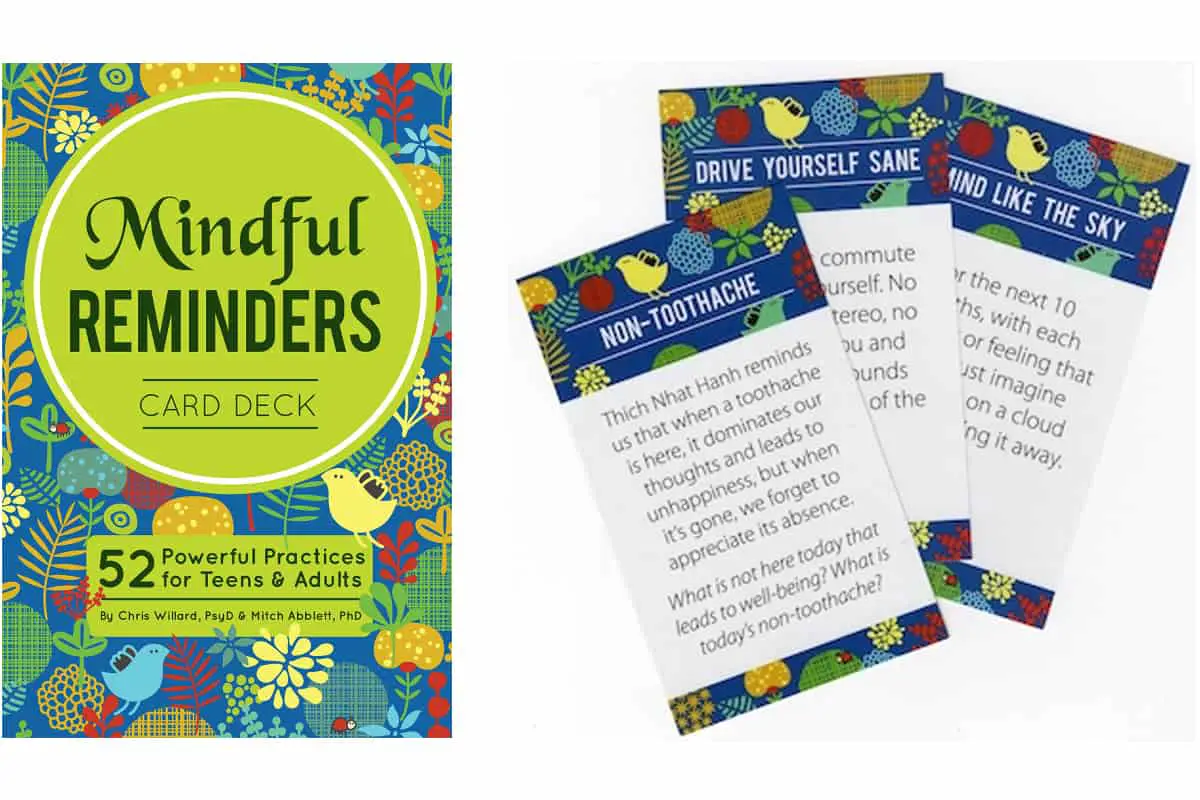
Players: 1+ | Age: 10+ | Author: Christopher Willard and Mitch Abblett
Mindful Reminders Card Deck: 52 Powerful Practices for Teens & Adults includes 50 simple activities for individual or group exercises. They help teens better deal with stress, be more focused and live a mindful life. The cards are divided into 4 categories:
includes 50 simple activities for individual or group exercises. They help teens better deal with stress, be more focused and live a mindful life. The cards are divided into 4 categories:
- Mind like the sky, e.g. “For the next 10 breaths, with each thought or feeling that arises, just imagine placing it on a cloud and breathing it away”
- Pencil yourself in, e.g. “Open your calendar or phone. Scan the day for a free moment and pencil in a reminder or alert to just breathe and be.”
- Making sense, e.g. “Check in with your five senses. Which one most anchors you to the present right now?”
- Sit with your laurels, e.g. “Bring to mind a past experience of success. Just sit with the image in mind and sensations in your body for 30 seconds.”
I recommend Mindful Reminders for beginners because it features helpful introductory mindfulness practices that are simple to apply and help reduce anxiety or stress. Activities include breathing, connecting with your own senses, and clearing the mind. Nothing extraordinary but it works.
RETHiNK (PESI Publishing & Media)
★★★☆☆
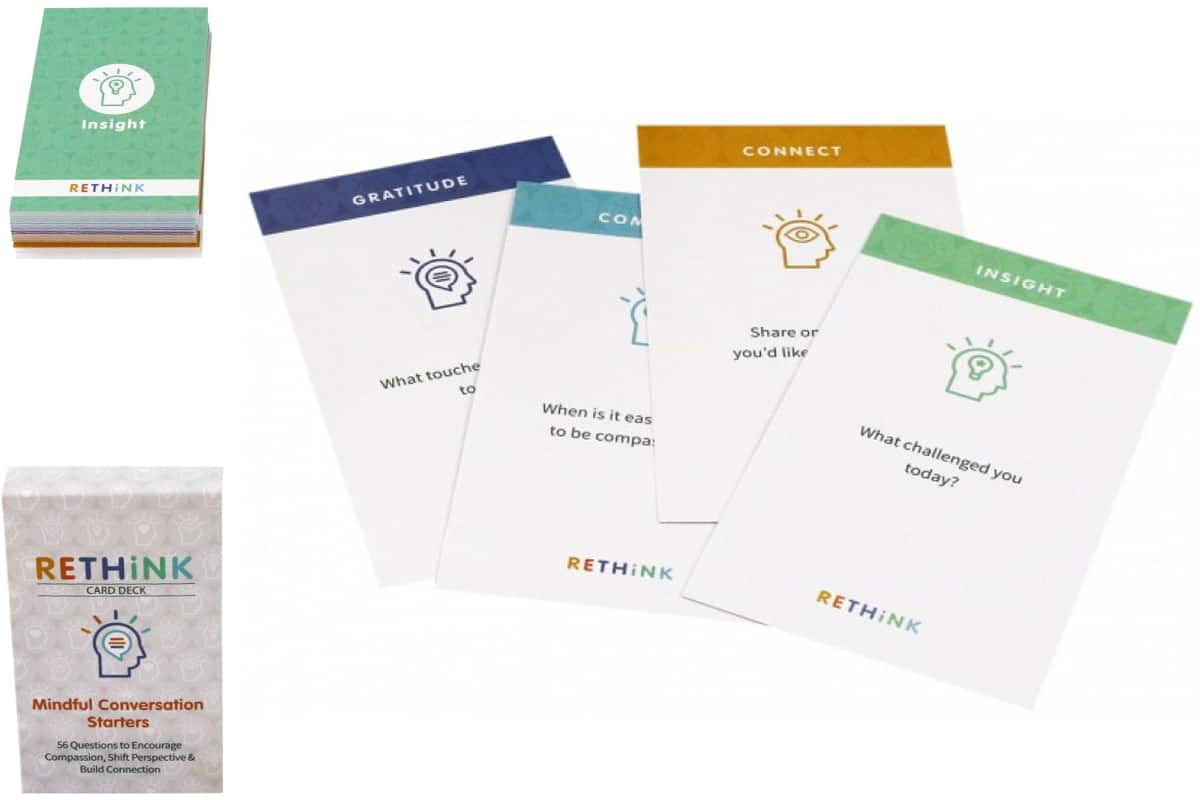
Players: 1+ | Age: 12+ | Author: Theo Koffler
RETHiNK is a deck that includes 56 conversation starter cards, divided in four categories: Connect, Gratitude, Compassion and Insight. Each question is very short an simple, but can be profound, for example:
is a deck that includes 56 conversation starter cards, divided in four categories: Connect, Gratitude, Compassion and Insight. Each question is very short an simple, but can be profound, for example:
- Connect: What brings you the greatest happiness?
- Gratitude: Where can you help people more?
- Compassion: What kind gesture have you offered today?
- Insight: If you could go back in time and say one thing to your former self, what moment would you go back to and what would you say?
I recommend RETHiNK because the questions trigger meaningful conversations that you would normally never have with the teen, and also because answering these questions will enable him or her to become more compassionate or empathetic.
You can find many other conversation starter games that build empathy in the following post about Empathy Card G ames on the edudingo blog
ames on the edudingo blog
Other Mindfulness Card Games
Be You card deck: it includes 60 mindfulness practices to help teens reduce negative feelings such as anxiety, stress, anger, and depression and nurture positive ones. It is recommended for age 12-18.
card deck: it includes 60 mindfulness practices to help teens reduce negative feelings such as anxiety, stress, anger, and depression and nurture positive ones. It is recommended for age 12-18.
Teen Mindfulne ss Skills (for therapists or counselors) includes discussion starter cards that help teens in battling with anxiety and stress. Cards include open-ended questions or sentences that help teens reflect on the situations and activities that make them anxious and worried. Recommended for age 12–18.
ss Skills (for therapists or counselors) includes discussion starter cards that help teens in battling with anxiety and stress. Cards include open-ended questions or sentences that help teens reflect on the situations and activities that make them anxious and worried. Recommended for age 12–18.
Meditation and Self-Care Card Games
Meditation and self-care are closely related to mindfulness. That is why I include some meditation and self-care games in this selection.
Self-Compassion & Mindfulness for Teens is a card game suitable for children aged 13 and up. The deck is a good conversation starter for various topics, anger, anxiety, depression, to name a few. It consists of 54 cards that include mindfulness, compassion and kindness exercises.
is a card game suitable for children aged 13 and up. The deck is a good conversation starter for various topics, anger, anxiety, depression, to name a few. It consists of 54 cards that include mindfulness, compassion and kindness exercises.
Melt Worry and Relax cards are suitable for age 15 and up and can be used at home, school or during therapy session. The deck includes 56 strategies that help teens relax and feel less stress and anxiety and be more mindful, happy and calm. The cards are divided into four categories: Being Mindful, Doing, Thinking and Relaxing.
cards are suitable for age 15 and up and can be used at home, school or during therapy session. The deck includes 56 strategies that help teens relax and feel less stress and anxiety and be more mindful, happy and calm. The cards are divided into four categories: Being Mindful, Doing, Thinking and Relaxing.
Edudingo.com is a participant in the Amazon Services LLC Associates Program, an affiliate advertising program designed to provide a means for sites to earn advertising fees by advertising and linking to Amazon.com. We also participate in other affiliate programs which compensate us for referring traffic.
